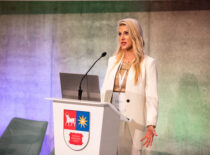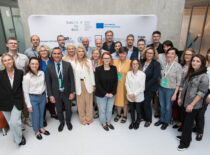“It is not a secret that, in the coming years, AI will have a significant impact on the world’s GDP, which is expected to increase by 14% by 2030 due to accelerated development and deployment of AI solutions. Currently, Lithuania has a strong AI community with an emerging AI ecosystem and is considered an economy with moderate AI foundations, with a potential for a significant economic impact,” said Paulauskaitė-Tarasevičienė, the Head of the Kaunas University of Technology AI Centre.
The SustAInLivWork project, which opening event AI for Sustainable Future was held on 14 September, aims to create a joint Centre of Excellence in Lithuania, which would act as a lighthouse, making a significant impact on strengthening the research and innovation ecosystem nationally and internationally.
The Centre of Excellence is based on long-term strategic cooperation between four Lithuanian Universities – KTU, Lithuanian University of Health Sciences (LSMU), Vytautas Magnus University (VMU) and VILNIUS TECH, – and two advanced partners – Tampere University (Finland) and Hamburg University of Technology (Germany).
Four key sectors
According to the Lithuanian AI Strategy, the development of AI in the country should focus on four key sectors: manufacturing, health, energy, and transport. The project has involved a lot of discussion and debate on how AI in manufacturing could optimise supply chain management, quality control through computer vision, enable predictive maintenance, and improve the efficiency of operations with autonomous robots.
The project touched on the important role AI plays in healthcare too, because it greatly improves healthcare research and outcomes by helping to make accurate diagnoses and facilitating personalised treatments, as it can process large amounts of data, understand diseases, and provide early detection and prediction. “By applying AI in hospitals and clinics, healthcare systems can become smarter, faster, and more efficient in delivering healthcare to millions of people around the world,” said Paulauskaitė-Tarasevičienė.
Regarding the energy grid, AI highlights its potential across the generation, transmission, and consumption of electricity: AI can enhance reliability by harnessing the power of data analytics and intelligent decision-making paving the way for a smarter and more sustainable energy future.
















